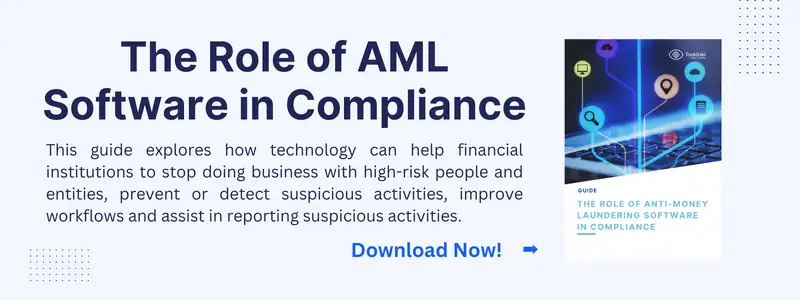Anti-Money Laundering (AML) compliance is of utmost importance in Nigeria as it plays a vital role in safeguarding the integrity of the country's financial system and combating illicit financial activities. Nigeria, being one of the largest economies in Africa, is susceptible to various money laundering risks due to its diverse financial landscape and cross-border transactions. AML regulations are designed to prevent criminals from disguising the origins of illicit funds and ensure transparency and accountability in financial transactions
For financial institutions operating in Nigeria, comprehending the AML requirements is crucial. Compliance with these regulations helps maintain the credibility of the financial sector, protect customers from financial crimes, and ensure adherence to international standards. A thorough understanding of AML obligations empowers businesses to implement effective risk-based AML programs and strengthen their ability to detect and prevent suspicious activities.
As Nigeria continues to evolve in response to changing AML threats, businesses and financial institutions must be well-versed in the latest AML guidelines and best practices to navigate the complex regulatory landscape and foster a secure financial environment for all stakeholders.
Regulatory Landscape for AML in Nigeria
The Regulatory Framework for AML in Nigeria
The AML regulatory framework in Nigeria is governed by various laws, regulations, and guidelines aimed at combating money laundering, terrorist financing, and other financial crimes. Key institutions involved in enforcing AML compliance include the Central Bank of Nigeria (CBN), the Economic and Financial Crimes Commission (EFCC), and the Nigerian Financial Intelligence Unit (NFIU). These institutions collaborate to ensure a robust AML regime that adheres to international standards and best practices.
Key AML Laws, Regulations, and Guidelines
Some of the prominent AML laws and regulations in Nigeria include the Money Laundering (Prohibition) Act, the Terrorism (Prevention) Act, and the Anti-Terrorism (Freezing of Funds) Regulations. The Central Bank of Nigeria also issues AML/CFT regulations and guidelines that financial institutions must follow to prevent money laundering and terrorist financing activities.
Roles and Responsibilities of Relevant Government Agencies
The Central Bank of Nigeria (CBN) plays a pivotal role in formulating and implementing AML/CFT regulations for banks and other financial institutions. The Economic and Financial Crimes Commission (EFCC) investigates and prosecutes money laundering cases and related financial crimes. The Nigerian Financial Intelligence Unit (NFIU) is tasked with receiving, analyzing, and disseminating suspicious transaction reports and other relevant financial information.
These government agencies collaborate to conduct regular inspections and audits of financial institutions to ensure compliance with AML regulations and maintain the integrity and stability of Nigeria's financial system.
.png?width=800&height=800&name=Nigeria%20-%20FATF%20(1).png)
AML Requirements for Businesses and Financial Institutions
Specific AML Requirements and Obligations
Businesses and financial institutions operating in Nigeria are subject to a range of AML requirements and obligations. These include conducting risk assessments to identify and assess potential money laundering and terrorist financing risks. Entities are mandated to develop and implement comprehensive AML programs tailored to their specific risk profiles. These programs must cover various aspects such as customer due diligence, transaction monitoring, and reporting of suspicious activities.
Customer Due Diligence (CDD) and Know-Your-Customer (KYC) Procedures
Stringent customer due diligence and know-your-customer procedures are essential components of AML compliance in Nigeria. Financial institutions are required to verify the identity of their customers, understand the nature and purpose of their transactions, and assess the risks associated with these relationships. Robust KYC measures aid in preventing the use of financial systems for illicit activities and enable early detection of suspicious behaviour.
Reporting Suspicious Transactions and Transaction Monitoring
In line with AML requirements, businesses and financial institutions are obligated to report any suspicious transactions or activities to the appropriate authorities, such as the Nigerian Financial Intelligence Unit (NFIU). Timely reporting of suspicious activities enhances the effectiveness of AML efforts and supports law enforcement in combating financial crimes. Additionally, transaction monitoring is vital to identify unusual patterns or transactions that may indicate potential money laundering or terrorist financing activities.
Compliance with these AML requirements not only safeguards businesses and financial institutions from becoming unwitting participants in illicit activities but also helps maintain the integrity of Nigeria's financial system and contributes to the overall security of the country.
Penalties for Non-Compliance
Penalties and Consequences for Non-Compliant Entities
Non-compliance with AML regulations in Nigeria can result in severe penalties and consequences for businesses and financial institutions. The authorities take AML violations seriously to combat money laundering and terrorist financing effectively. The penalties for non-compliance can include hefty fines, suspension or revocation of licenses, and even criminal prosecution for willful violations.
Legal and Reputational Risks of Non-Compliance
In addition to the monetary fines and legal repercussions, non-compliant entities face significant reputational risks. Public exposure of AML violations can tarnish the image of businesses and financial institutions, leading to a loss of customer trust and investor confidence. The resulting damage to the organization's reputation can have long-term effects, impacting its ability to attract new customers, partners, and investors.
To avoid these severe consequences, businesses and financial institutions must prioritize AML compliance and stay up-to-date with the evolving regulatory landscape. Implementing robust AML programs and leveraging technology-driven solutions can help mitigate risks, enhance detection capabilities, and ensure adherence to AML requirements. By proactively embracing a culture of compliance, entities can safeguard their reputation, protect stakeholders' interests, and contribute to a safer and more secure financial ecosystem in Nigeria.
Best Practices for AML Compliance in Nigeria
Implementing Effective AML Programs
To ensure robust AML compliance in Nigeria, businesses and financial institutions should implement comprehensive AML programs tailored to their specific risk profiles. This includes conducting thorough risk assessments to identify potential money laundering and terrorist financing risks relevant to their operations. By understanding these risks, entities can design targeted AML measures to detect, prevent, and report suspicious activities effectively.
Adopting Risk-Based Approaches and AML Technology Solutions
A risk-based approach is essential in prioritizing AML efforts and resources where they are most needed. Businesses and financial institutions should continuously monitor and update their AML programs to address emerging risks and comply with evolving regulations. Leveraging advanced AML technology solutions, such as artificial intelligence and machine learning, can significantly enhance detection capabilities and reduce false positives, streamlining compliance processes and optimizing operational efficiency.
Read More: The Role of Technology in Strengthening AML Compliance in Nigeria
Conducting Training and Awareness Programs
Creating a culture of compliance requires active engagement and training of staff and stakeholders. Regular AML training and awareness programs should be conducted to educate employees about AML requirements, red flags, and reporting obligations. A well-informed workforce is better equipped to identify suspicious activities and contribute to the overall effectiveness of the AML program. Additionally, fostering a strong compliance culture sends a clear message of the organization's commitment to combating financial crime and mitigating risks.
By adhering to these best practices, businesses and financial institutions can build a robust AML framework that aligns with regulatory expectations, minimizes vulnerabilities, and strengthens the resilience of Nigeria's financial system against illicit activities. A proactive and comprehensive approach to AML compliance not only safeguards the institution but also bolsters the country's efforts in fostering a secure and transparent financial environment.
AML Trends and Future Outlook in Nigeria
Emerging Trends and Advancements in AML Practices
As the global financial landscape continues to evolve, so do money laundering and terrorist financing risks. In Nigeria, there are emerging trends in AML practices driven by advancements in technology, the increasing complexity of financial transactions, and the evolving methods used by criminals to exploit vulnerabilities. Fintech innovations, cryptocurrencies, and digital payment platforms have introduced new challenges for AML compliance, requiring financial institutions to continuously adapt their strategies.
Additionally, data analytics and artificial intelligence are playing a crucial role in enhancing AML capabilities. These technologies enable more effective risk assessments, improved transaction monitoring, and the identification of previously unknown patterns of suspicious behavior. The integration of machine learning algorithms allows for real-time detection of anomalies and the reduction of false positives, ultimately streamlining AML processes.
Impact of Global AML Developments on Nigeria's Regulatory Landscape
Global efforts to combat money laundering and terrorist financing are continually shaping AML regulations and best practices in Nigeria. As a member of international organizations such as the Financial Action Task Force (FATF), Nigeria is influenced by the evolving AML standards and guidelines set forth by these entities. Aligning with global AML developments is crucial to maintaining the country's position in the international financial system and safeguarding against potential financial crime risks.
Nigeria's regulatory authorities are also closely monitoring and adopting measures to address emerging AML trends and threats. As the AML landscape evolves, financial institutions operating in Nigeria must remain vigilant, stay abreast of regulatory updates, and implement agile AML solutions to effectively mitigate risks and protect their customers and businesses.
Final Thoughts
In conclusion, understanding AML requirements is paramount for businesses and financial institutions operating in Nigeria. The country's robust regulatory framework emphasizes the need for compliance to combat money laundering and terrorist financing effectively. By adhering to specific AML obligations, businesses and financial institutions play a critical role in creating a secure and transparent financial ecosystem that fosters trust among customers and partners.
As the AML landscape evolves, embracing technology-driven solutions becomes essential to stay ahead of emerging risks and efficiently manage compliance efforts. Leveraging advanced technologies, such as artificial intelligence and machine learning, empowers financial institutions to enhance their AML capabilities, streamline processes, and identify potential threats in real-time.
For businesses and financial institutions in Nigeria seeking effective AML solutions, Tookitaki offers cutting-edge technology designed to address the unique challenges of AML compliance. By adopting Tookitaki's solutions, financial entities can bolster their AML programs, reduce risks, and safeguard their reputation in the financial industry.
Take a step towards building a resilient financial ecosystem by embracing technology-driven AML solutions. Contact Tookitaki today for a demonstration and experience the power of innovation in combating financial crime while ensuring compliance with AML requirements in Nigeria. Together, let's create a safer and more secure financial landscape for all stakeholders.
Anti-Financial Crime Compliance with Tookitaki?




